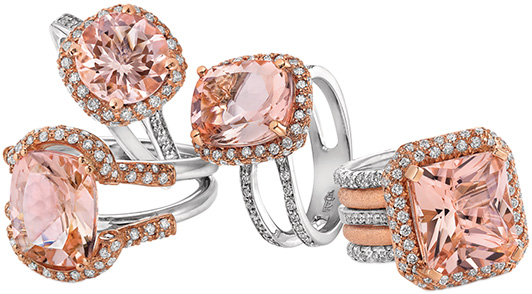|
Cover
Private Collection
Shopping is by appointment only at Stephen’s Fine Jewelry in Leawood, Kansas.
By Joyce Kauf
 |
Makur
|
“I’m like a jewelry doctor on call 24/7,” says Stephen Burstein, citing the calls he gets from customers at all hours of the day and night and the visits he makes bringing jewelry to their homes. But these customers haven’t shopped the aisles of his store — in fact, there is no store. Burstein, owner of Stephen’s Fine Jewelry, works by appointment only, selling designer and custom jewelry and watches out of a showroom in Leawood, a suburb of Kansas City, Kansas.
A fifth-generation jeweler, Burstein began his career at the family-owned Meyer Jewelry, established in 1885. “I knew that no matter how old I was, I would always be known as Mr. Meyer’s grandson,” Burstein recalls, adding that his grandfather encouraged him to go out on his own. Not wanting to be competitive with his family, Burstein opted for a different approach to retail and in 1977, began selling jewelry out of his apartment.
Even with a family ensconced in the business, Burstein recognized he had a unique challenge in getting his name out to the public. Always involved in civic organizations and nonprofits, he mined their events for contacts. “I networked, joined boards and often donated a piece of jewelry for charity.” While many events did not bring in “a lot of money,” they generated a “word-of-mouth” buzz that eventually created name recognition.
Burstein was faced with an almost insurmountable setback in 1987 when he was robbed — while changing from one insurance carrier to another, which subsequently left him without any insurance. Although he admits he began his business with no plan, he devised a solution to salvage this same business. Declaring bankruptcy was not an option. He worked out arrangements with some dealers, but was sued by others. “It took me seven and one-half years to pay it all back and I slowly started rebuying and rebuilding my business.” In 1994, he opened a 540-square-foot office with two showcases. Fifteen years later in 2009, he moved to his current location with 12 display cases merchandised by category. “Some people think I have more pieces than a jewelry store,” he points out.
Along with the expanded offerings, Burstein broadened his efforts at attracting new customers. He has shifted his focus to social media, especially since 70 percent of his customers are age 40 and younger and he recently hired someone to oversee his Facebook page.
Restaurants have provided another avenue for business. Kansas City has become known as a “foodie city” and attracts many chefs, among them Leslie and Nick Goellner, Burstein’s daughter and son-in-law, who have provided entrée to a new customer base. “Ninety percent of the chefs and their staff buy engagement rings from me,” Burstein points out, adding that many remain customers when they move to other cities. And while he reluctantly acknowledges that one reason he became a private jeweler is because he realized he would “never have made it in baseball,” Burstein has found baseball to be an important source of customers. As a season ticket holder to the Kansas City Royals, he has met team members and executives. Even visiting teams have become his customers.
Diamonds represent 90 percent of his business “by far,” with bridal his strongest category. The average center stone is 1.3 carats with settings in 14-karat and 18-karat white gold and platinum. Key vendors include Armadani, Makur and Sasha Primak.
After rings, Burstein identifies earrings and pendants as his top sellers. Popular colored gemstones include sapphires, emeralds and rubies. Custom accounts for 35 percent to 40 percent of his work. “We can make just about anything,” Burstein says, adding, “and often for better quality since nothing is mass-produced.” And at better prices, too, since as an appointment-only jeweler, Burstein does not have the overhead of a retail store.
Burstein recognizes that he cannot compete with the larger stores in Kansas City for designer exclusivity. Style is a critical factor in selecting designers. “I don’t want to look at a piece today and say it was popular in 2014,” he explains. Price and workmanship also rank among the top criteria. “I inspect every piece — from seeing how it was cast to how it was polished,” he says.
Since word of mouth is essential to his business, Burstein often gives gift cards to customers who refer people to him and specially made candles to bridal couples. However, he is very excited about his new incentive — a $100 gift card that enables customers to register their diamond at the Museum of Named Diamonds (MoND). This recently launched website allows people to name their diamond and share their story — and the stone’s story — online.
Burstein attributes his success to the one-on-one attention and the no-pressure environment. Customers love the intimacy of being the only people in the showroom. “People feel as if they have a personal jeweler,” he adds. And putting people at ease has become second nature to him. “I’m lucky to have found this niche,” Burstein concludes.Article from the Rapaport Magazine - July 2016. To subscribe click here.
|
|